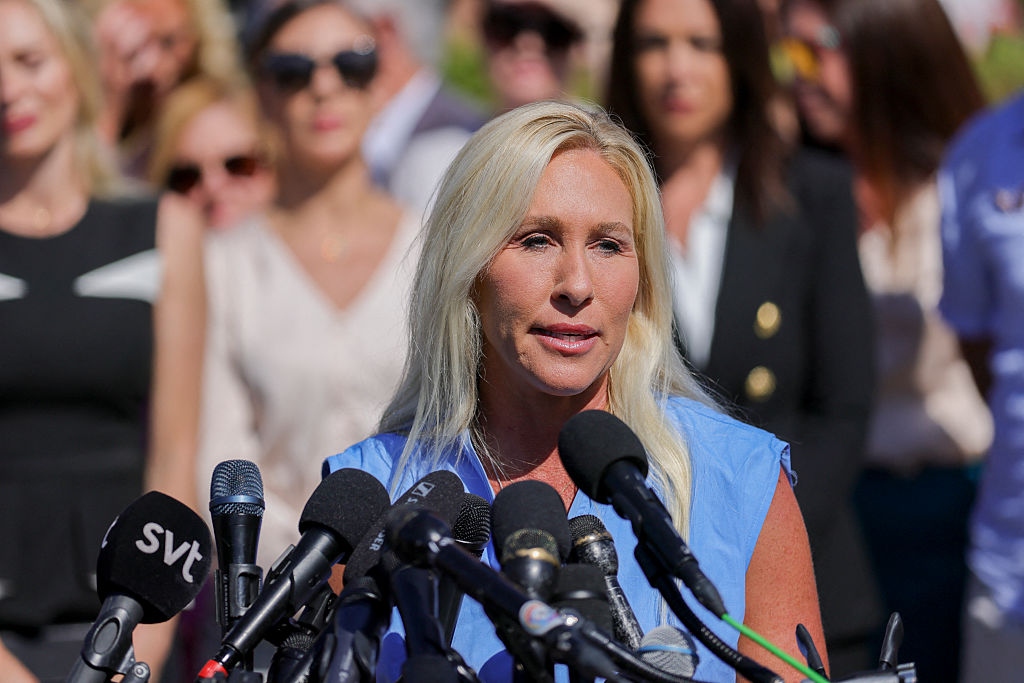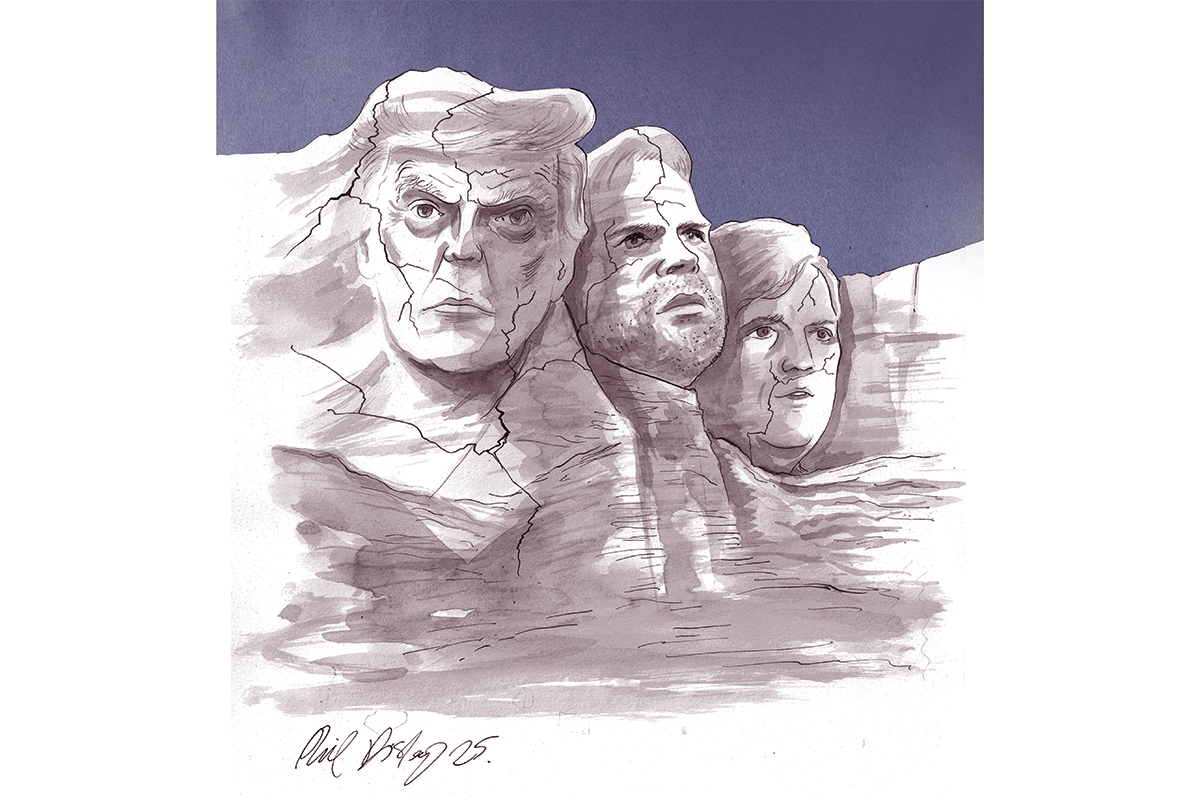The first thing a Minnesota political activist tells me when I ask about Tim Walz is this: when he gets mad, he tends to spit when he talks. The blue-state governor’s version of Minnesota Nice leans hard on the aggressive side of passivity, with an abiding predilection for taking offense at questions that fall into the category of what most politicians expect. His superior on the Democratic ticket, Kamala Harris, responds to such queries with awkward laughter in an attempt to buy time for an answer. But for Walz, the very act of questioning is felt as an insult to his character, leading to an unleashing of bitter invective founded in righteous anger that will absolutely lead to a follow-up call from his staff, as it did for multiple people over his years in Minnesota politics.
Walz has much to be mad at Republicans about these days — and his anger is only likely to increase in the coming weeks. Every vice-presidential pick gets targeted to some extent, particularly those who are relatively unknown nationally. But there’s a special place in the target zone for politicians from politically homogeneous states, where the lack of true opposition results in people climbing the ladder without having to navigate the challenges of a competitive environment. Getting questioned on your home turf is something many politicians can now thoroughly avoid given the diminished presence of local media — but on the national level, things can change rapidly, and new questions from people whose careers don’t depend on access to a governor raise the possibility that their carefully constructed narrative may have some holes in it.
What Walz satisfies in this moment is a deep and abiding desire of American progressives: they want an MSNBC daddy. It’s the closest thing to a political fetish, longing for someone who exudes some masculinity but not too much, a degree of strength but not too much, a willingness to fight for cause and country, but, again, not too much. For this task, Walz is perfect — a round Midwestern man clad in fresh new work clothes, in a governorship where the only question is how far left he wants to push.
Walz has emphasized the elements of his past that seem crafted for an audience on the left; they’ve been rolled out eagerly by the Harris campaign. He has claimed to be the only member of Congress who retired at the highest level of an enlisted Army officer, command sergeant major, after serving twenty-four years in the National Guard — invoking his service as proof of his authority to argue for gun control against the “weapons of war” he carried. The campaign declared Walz to be a wildly successful high school football coach, turning around a lackluster team to win multiple state championships while also spearheading a high-school gay-straight alliance. On the culture-war front, Walz repeatedly claimed that his family was only possible thanks to in vitro fertlization (IVF), a practice he and his fellow Democrats have falsely accused Republicans of wanting to ban.
Walz’s biographical points have significant political resonance in 2024, and they’re key to understanding why Kamala Harris picked him. He so impressed her campaign in performances with friendly interviewers, particularly a guest spot on the Obama-bro podcast Pod Save America where he called J.D. Vance “weird,” that Harris chose him over swing-state options like rising star Josh Shapiro, governor of Pennsylvania, or Arizona astronaut-turned-senator Mark Kelly. Walz’s storyline won out, despite the fact that his bright blue state would go Harris anyway, and his being the farthest left of any of the VP candidates.
These stories fit the moment so perfectly that it’s a shame so many of them are false or exaggerated. Walz, repeatedly introduced at rallies and in interviews over the years as being a veteran of combat during the War on Terror, never saw combat or deployed to a war zone — instead, he left the National Guard to run for Congress when his unit was about to deploy to Iraq. His coaching job turns out to have been a volunteer defensive assistant position, which he left after just a few years. And as for IVF, the New York Times reported that the Walz family never used it — instead turning to the much less invasive and ethically less controversial use of artificial insemination.
In each case, Walz’s exaggerations suggest a deeper problem than the typical big fish stories told by incalculable numbers of politicians over the years. The many tall tales told by Joe Biden, for instance, occasionally have an intended political benefit — particularly the numerous résumé-enhancing claims made in his 1988 campaign, which ultimately led to an epic fall from grace. But what political gain is there in his many recitations of confronting a fellow by the name of “Corn Pop” at a Delaware pool? These fall into the category of elderly musings about a hazy, half-remembered past, more like Grampa Abe Simpson’s ramblings. If Walz were just claiming he used to wear an onion in his belt (it was the style at the time), his aggressive fictionizing would have a certain charm. Instead, it reads as a bizarre aspect to a newly nationalized political character, one who tells lies to gain advantage rather than just entertain the bored voter.
Yet given the early success of the choice, adding Walz to the ticket puts paid to the idea that what Americans want at this moment, more than anything, is authenticity. Who has time for that? Instead, American voters seem to crave a form of inauthenticity that reads as transparent and wholesome, perfect for the TikTok age. It’s ideally suited for politicians who are deeply ambitious and willing to do anything that is demanded at the moment. So it doesn’t matter that Kamala Harris had the most leftist record of any senator during her tenure, even more than Bernie Sanders, so long as her vibe is of a laughing, smiling, multiethnic version of America’s wine mom. She’s a vehicle, not a candidate — and Walz is just happy to be on the ride.
Of the two, though, it’s his record that seems more in keeping with ambitions for a second term. “Don’t ever shy away from our progressive values. One person’s socialism is another person’s neighborliness,” Walz told a caller on one of the campaign’s specially-targeted Zoom meetings. “Just do the damn work.” In this case, the work is going to be aggressively leftist, designed around a combination of Berkeley-San Francisco culture-war priorities and the Minnesota Democratic-Farmer-Labor mish-mash of big government spending and authoritarian busybodies.
Despite what should be a golden opportunity for Republicans, the Trump-Vance ticket has struggled to find its footing since the switch from Biden. Their operation was carefully constructed to prosecute the political case against the past four years of meandering policy on the economy, immigration and security issues, foreign and domestic. The curveball of facing off against a younger ticket with the full investment of the media and Hollywood at its back wasn’t something they were prepared to handle. And unless they unlock a new line of attack within the coming weeks, they may let one of the most unpopular administrations in American history snatch victory from the jaws of defeat. It would be a devastating failure for Republicans, after all the things that have vindicated their critiques of Biden and Harris, to see the man who leads and defines their remade populist coalition flail his way into losing to a candidate who, as recently as this spring, was viewed as a major liability for her party.
Republicans are generally used to the imbalanced nature of the coverage they receive on the national stage, from journalists and commentators alike. But the bias is so heavy in this election it may prove impossible to overcome. The major networks — ABC, NBC and CBS — currently employ not even a single pro-Republican or pro-Trump commentator. The opinion pages of the Atlantic and the New York Times employ conservatives of the likes of David French, who eagerly endorsed Kamala Harris despite years of arguing against her radical record on abortion. As for campaign journalists, their complaints are more about lack of interview access than the ludicrous level to which Harris has run away from her entire policy record.
Together, Harris and Walz represent a new approach to a form of American politics where positions are meaningless, honesty is irrelevant and the truth of stories is all about feelings, not the facts. As such, they can be viewed as a natural leftward response to the arrogant bullshittery of the man they claim to hate the most. If Donald Trump can lie about how much money he has, how tall his buildings are, or whether a sack of money delivered to a porn star is accounted as a legal expense instead of a payoff, who can expect Tim Walz to be honest about IVF or Kamala Harris to be forthright about her toddler demand for “fweedom?” It’s a path toward even more unserious politics in an age of near-complete distrust of institutions. Who cares if the courts get packed? Who cares if the wall actually gets built or not? Who cares whether the stories are true? It’s only the vibes that count.
This article was originally published in The Spectator’s October 2024 World edition.























Leave a Reply